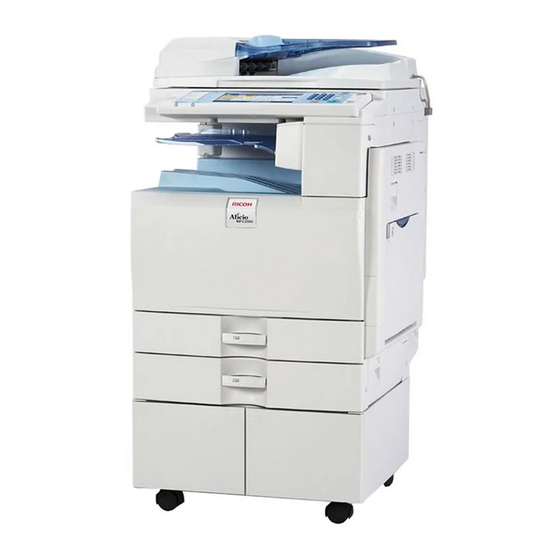Ricoh Aficio MP C4000 Benutzerhandbuch - Seite 36
Blättern Sie online oder laden Sie pdf Benutzerhandbuch für Scanner Ricoh Aficio MP C4000 herunter. Ricoh Aficio MP C4000 41 Seiten. Papercut ricoh embedded manual
Auch für Ricoh Aficio MP C4000: Broschüre & Specs (8 seiten), Merkmale Handbuch (27 seiten)

PaperCut – Ricoh Embedded Manual
A typical case is the checksum being reported after the card number, separated by
an equals sign, such as in 5235092385=8. PaperCut can handle this case by
default; it will extract the number before the equal sign as the card number:
5235092385.
Regular Expression Filters
For some cases, a "regular expression" may be required that will filter the card
number from the complete string of characters reported by the card reader.
Documentation on regular expressions can be found on the Internet, e.g. at
www.regular-expressions.info.
o The regular expression must be fashioned so that the card number is
returned as the first match group.
o Usually one regular expression will be used for all the devices managed by
PaperCut; this must be entered in the "Config editor (advanced)" which you
will find on the Options tab under Actions. The key is called "ext-device.card-
no-regex".
o The global setting however can be overridden on a per-device basis: The key
"ext-device.card-no-regex" can also be found on the " Advanced Config tab in
the device details screen. This setting will override the global setting unless
the keyword "GLOBAL" is specified.
o PaperCut developers will gladly assist in producing a regular expression
when supplied with a few sample outputs from your card reader. Please
contact PaperCut support.
o If you would like to write your own regular expressions, here are some
examples:
Card Number Format Converters
In addition to extracting parts of the card numbers using regular expressions, converting
numbers from one format to another is a common requirement. For example a card reader
may report in hexadecimal format, while the number stored in the source (e.g. Active
Directory) is in a decimal format. PaperCut includes a number of inbuilt converters to assist
here.
Note: Many card readers are configurable - the number format can be changed at the
hardware level via utility or configuration tools. PaperCut's software-level converters are
there to support card readers that don't offer this level of configuration, or where a global
software-level conversion is a better choice. For example it may be quicker to do the
conversion in PaperCut rather than manually reprogram 100+ readers!
Like regex's, the convertors may be defined on either a global (all devices) or on a per-
device basis.
To set globally:
Options -> Actions -> Config Editor
Search for "ext-device.card-no-converter"
Copyright © 2012 PaperCut Software International Pty. Ltd., All Rights Reserved.
Revision: 19
Use the first 10 characters (any character): (.{10})
Use the first 19 digits: (\d{19})
Extract the digits from between the two "=" characters in
"123453=292929=1221": \d*=(\d*)=\d*
2012-10-26
36 of 41
